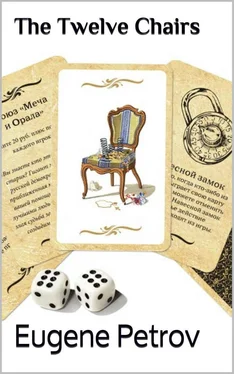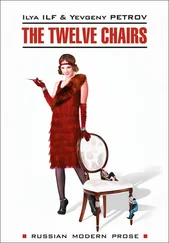Eugene Petrov - The Twelve Chairs
Здесь есть возможность читать онлайн «Eugene Petrov - The Twelve Chairs» весь текст электронной книги совершенно бесплатно (целиком полную версию без сокращений). В некоторых случаях можно слушать аудио, скачать через торрент в формате fb2 и присутствует краткое содержание. Год выпуска: 2013, Жанр: Юмористическая проза, на английском языке. Описание произведения, (предисловие) а так же отзывы посетителей доступны на портале библиотеки ЛибКат.
- Название:The Twelve Chairs
- Автор:
- Жанр:
- Год:2013
- ISBN:нет данных
- Рейтинг книги:5 / 5. Голосов: 1
-
Избранное:Добавить в избранное
- Отзывы:
-
Ваша оценка:
- 100
- 1
- 2
- 3
- 4
- 5
The Twelve Chairs: краткое содержание, описание и аннотация
Предлагаем к чтению аннотацию, описание, краткое содержание или предисловие (зависит от того, что написал сам автор книги «The Twelve Chairs»). Если вы не нашли необходимую информацию о книге — напишите в комментариях, мы постараемся отыскать её.
Find traces of a separate headset difficult and heroes face different adventures and troubles.
The Twelve Chairs — читать онлайн бесплатно полную книгу (весь текст) целиком
Ниже представлен текст книги, разбитый по страницам. Система сохранения места последней прочитанной страницы, позволяет с удобством читать онлайн бесплатно книгу «The Twelve Chairs», без необходимости каждый раз заново искать на чём Вы остановились. Поставьте закладку, и сможете в любой момент перейти на страницу, на которой закончили чтение.
Интервал:
Закладка:
difficulties involved in their treasure hunt. To find their way into the
theatre as they had planned proved impossible. Galkin, Palkin, Malkin,
Chalkin and Zalkind slept in the wings, since their modest earnings
prevented them from living in a hotel.
The days passed, and the friends were slowly reaching the end of their
tether, spending their nights 'at the site of Lermontov's duel and
subsisting by carrying the baggage of peasant tourists.
On the sixth day Ostap managed to strike up an acquaintance with
Mechnikov, the fitter in charge of the hydraulic press. By this time,
Mechnikov, who had no money and was forced to get rid of his daily hang-over
by drinking mineral water, was in a terrible state and had been observed by
Ostap to sell some of the theatre props at the market. Final agreement was
reached during the morning libation by a spring. The fitter called Ostap
"Palsie" and seemed about to consent.
"That's possible," he said. "That's always possible, palsie. It's my
pleasure, palsie."
Ostap realized at once that the fitter knew his stuff.
The contracting parties looked one another in the eye, embraced,
slapped each other's backs and laughed politely.
"Well," said Ostap, "ten for the whole deal."
"Palsie!" exclaimed the astonished fitter, "don't make me mad. I'm a
man who's suffering from the narzan."
"How much do you want then?"
"Make it fifty. After all, it's government property. I'm a man who's
suffering."
"All right, accept twenty. Agreed? I see from your eyes you agree."
"Agreement is the result of complete non-objection on both sides."
"There are no flies on this one," whispered Ostap to Vorobyaninov.
"Take a lesson."
"When will you bring the chairs?"
"You'll get the chairs when I get the money."
"That's fine," said Ostap without thinking.
"Money in advance," declared the fitter. "The money in the morning, the
chairs in the evening; or, the money in the evening, the chairs the next
morning."
"What about the chairs this morning, the money tomorrow evening," tried
Ostap.
"Palsie, I'm a man who's suffering. Such terms are revolting."
"But the point is, I won't receive my money by telegraph until
tomorrow," said Ostap.
"Then we'll discuss the matter tomorrow," concluded the obstinate
fitter. "And in the meantime, palsie, have a nice time at the spring. I'm
off. Simbievich has me by the throat. I've no strength left. Can you expect
a man to thrive on mineral water?"
And resplendent in the sunlight, Mechnikov went off.
Ostap looked severely at Ippolit Matveyevich.
"The time we have," he said, "is the money we don't have. Pussy, we
must decide on a career. A hundred and fifty thousand roubles, zero zero
kopeks awaits us. We only need twenty roubles for the treasure to be ours.
We must not be squeamish. It's sink or swim. I choose swim."
Ostap walked around Ippolit Matveyevich thoughtfully.
"OS with your jacket, marshal," he said suddenly, "and make it snappy."
He took the jacket from the surprised Vorobyaninov, threw it on the
ground, and began stamping on it with his dusty boots.
"What are you doing?" howled Vorobyaninov. "I've been wearing that
jacket for fifteen years, and it's as good as new."
"Don't get excited, it soon won't be. Give me your hat. Now, sprinkle
your trousers with dust and pour some mineral water over them. Be quick
about it."
In a few moments Ippolit Matveyevich was dirty to the point of
revulsion.
"Now you're all set and have every chance of earning honest money."
"What am I supposed to do?" asked Ippolit Matveyevich tearfully. "You
know French, I hope? "
"Not very well. What I learned at school." "Hm . . . then we'll have to
operate with what you learned at school. Can you say in French, 'Gentleman,
I haven't eaten for six days'?"
"M'sieu," began Ippolit Matveyevich, stuttering, "m'sieu . . . er . . .
je ne mange .. , that's right, isn't it? Je ne mange pas . . . er How do you
say 'six'? Un, deux, trois, quatre, cinq, six. It's: 'Je ne mange pas six
jours' "
"What an accent, Pussy! Anyway, what do you expect from a beggar. Of
course a beggar in European Russia wouldn't speak French as well as
Milerand. Right, pussy, and how much German do you know?"
"Why all this?" exclaimed Ippolit Matveyevich. "Because," said Ostap
weightily, "you're now going to the Flower Garden, you're going to stand in
the shade and beg for alms in French, German and Russian, emphasizing the
fact that you are an ex-member of the Cadet faction of the Tsarist Duma. The
net profit will go to Mechnikov. Understand?"
Ippolit Matveyevich was transfigured. His chest swelled up like the
Palace bridge in Leningrad, his eyes flashed fire, and his nose seemed to
Ostap to be pouring forth smoke. His moustache slowly began to rise.
"Dear me," said the smooth operator, not in the least alarmed. "Just
look at him! Not a man, but a dragon."
"Never," suddenly said Ippolit Matveyevich, "never has Vorobyaninov
held out his hand."
"Then you can stretch out your feet, you silly old ass!" shouted Ostap.
"So you've never held out your hand?"
"No, I have not."
"Spoken like a true gigolo. You've been living off me for the last
three months. For three months I've been providing you with food and drink
and educating you, and now you stand like a gigolo in the third position and
say . . . Come off it, Comrade! You've got two choices. Either you go right
away to the Flower Garden and bring back ten roubles by nightfall, or else
I'm automatically removing you from the list of shareholders in the
concession. I'll give you five to decide yes or no. One. . ."
"Yes," mumbled the marshal.
"In that case, repeat the words."
"M'sieu, je ne mange pas six jours. Geben Sie mir bitte etwas Kopek fur
ein Stuck Brot. Give something to an ex-member of the Duma."
"Once again. Make it more heart-rending."
Ippolit Matveyevich repeated the words.
"All right. You have a latent talent for begging. Off you go.
The rendezvous is at midnight here by the spring. That's not for
romantic reasons, mind you, but simply because people give more in the
evening."
"What about you?" asked Vorobyaninov. "Where are you going?"
"Don't worry about me. As usual, I shall be where things are most
difficult."
The friends went their ways.
Ostap hurried to a small stationery shop, bought a book of receipts
with his last ten-kopek bit, and sat on a stone block for an hour or so,
numbering the receipts and scribbling something on each one.
"System above all," he muttered to himself. "Every public kopek must be
accounted for."
The smooth operator marched up the mountain road that led round Mashuk
to the site of Lermontov's duel with Martynov, passing sanatoriums and rest
homes.
Constantly overtaken by buses and two-horse carriages, he arrived at
the Drop.
A narrow path cut in the cliff led to a conical drop. At the end of the
path was a parapet from which one could see a puddle of stinking malachite
at the bottom of the Drop. This Drop is considered one of the sights of
Pyatigorsk and is visited by a large number of tourists in the course of a
day.
Ostap had seen at once that for a man without prejudice the Drop could
be a source of income.
"What a remarkable thing," mused Ostap, "that the town has never
thought of charging ten kopeks to see the Drop. It seems to be the only
Читать дальшеИнтервал:
Закладка:
Похожие книги на «The Twelve Chairs»
Представляем Вашему вниманию похожие книги на «The Twelve Chairs» списком для выбора. Мы отобрали схожую по названию и смыслу литературу в надежде предоставить читателям больше вариантов отыскать новые, интересные, ещё непрочитанные произведения.
Обсуждение, отзывы о книге «The Twelve Chairs» и просто собственные мнения читателей. Оставьте ваши комментарии, напишите, что Вы думаете о произведении, его смысле или главных героях. Укажите что конкретно понравилось, а что нет, и почему Вы так считаете.












